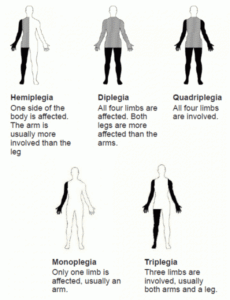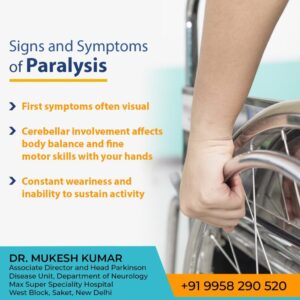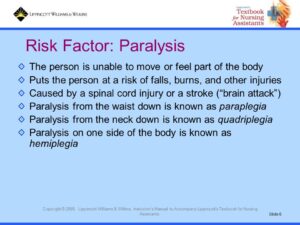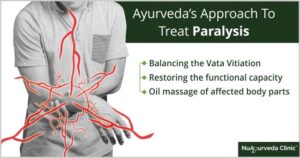Why there is loss of sensation of hand and feet?
Some people suffer from this condition while going through any trauma, accident or especially in older age that, they even can’t move their hands or feet, or if they try they have severe pain. We called this condition as paralysis.
What is Paralysis ?
Paralysis is condition of the body when some of the body parts are unable to work properly. It can have lots of different causes, some of which can be serious. Depending on the cause, it may be temporary or permanent and may be due to any injury to nerve which supply muscle result in loss of muscle function.
Paralysis can be complete or partial. It can occur on one or both sides of your body. It can also occur in just one area, or it can be widespread. Most paralysis is due to strokes or injuries such as spinal cord injury or a broken neck. Other causes of paralysis include:
Nerve diseases.
Autoimmune diseases .
Polio used to be a cause of paralysis.
Pattern of paralysis:
- Localized means when only one part of your body is affected. E.g.: face or hand.
- Generalized means when multiple parts of your body are affected. E.g.: arm or leg.
Generalized is further divided into four types:
- Monoplegia, only one arm or leg is affected.
- Diplegia, both arms or both legs are affected.
- Hemiplegia, one arm and one leg of same side is affected.
- Paraplegia, both of legs are affected.
- Quadriplegia, both arms and both legs are affected.

What are the causes of paralysis?
Now if someone has paralysis what the main reason of having these disease some of them are
- Autoimmune diseases( a disease in which own body cell destroy their own body cell), including multiple sclerosis (MS).
- Brain injuries, including conditions like cerebral palsy.
- Neurological diseases( disease in which nerve is involved. Actually nerve is the messenger that transfer message from the brain to specific organ), so damage to nerve means the signal cannot transfer properly and body cannot move.
- Stroke ( heart disease) and spinal cord injuries also cause paralysis.
- People born with birth defect such as underdevelopment of spinal cord also causes paralysis.

How to diagnose paralysis?
Many times it is easy to diagnose it, as you lose control over your muscles completely or partially. To identify it for the internal body part, the medical professionals use some medical test such as X-rays , MRI scans, CT scans, myelography, electromyography other imaging studies.
What Symptoms of paralysis show by patient
The main symptom of paralysis is the inability to move part of your body, or not being able to move at all.
It can start suddenly or gradually. Sometimes it comes and goes.
Paralysis can affect any part of the body, including:
- the face.
- the hands.
The affected part of your body may also be:
- stiff (spastic paralysis), with occasional muscle spasms.
- floppy (flaccid paralysis).
- numb, painful or tingly.

What are complications of paralysis?
Paralysis is one of the dangerous disease it cause more complication if not treated on time.
Some of the complications are;
- Cause breathing problem
- Speech and swallowing problem.
- Brain problem like depression anxiety.
- High blood pressure or low blood pressure depends on condition.
- Lose in control in urination or feces.
- Sexual problem.
Who is prone to paralysis?
You are at higher risk of paralysis if:
- You are suffering from diabetes ( high blood sugar level).
- smoker.
- If there is a family history.
- If you suffer from high blood pressure.
- If you do not indulge in adequate physical activity.
- Obese person.
- If Bell’s Palsy runs in your family ( disease in which your face nerve is injured).
- If you have high cholesterol levels.

What is the Treatment for paralysis ?
Currently, no cure for paralysis exists. However, depending on the cause and type of the issue, some people experience partial or complete recovery.
Temporary paralysis, such as that caused by Bell’s palsy or stroke, may resolve on its own without medical treatment.
Also, when paralysis results from a spinal cord injury or chronic neurological condition, a person may recover partial muscle control.
Although rehabilitation does not cure paralysis completely, it can help prevent symptoms from worsening.
Available treatments include:
- Physical therapy
- Occupational therapy
- Mobility devices, such as braces, walkers, and wheelchairs
- Medications.
- Surgical amputation.
- Nerve transfer surgery.
- Emotional and social support can also play vital roles in a person’s treatment.

How should someone prevent paralysis?
Paralysis is cause by one of most reason that is spinal injury so some precautions to be considered are
- Always wear a seatbelt. Make sure children are using car seats or booster seats correctly.
- Check water depths before diving.
- Don’t drive while under the influence or ride with an impaired driver.
- Use precautions when participating in sports or activities. For example, wear a helmet when playing sports. Have a spotter in gymnastics, and use cushioning mats when appropriate.
- Never move someone who may have a head, neck or spine injury.
Author


